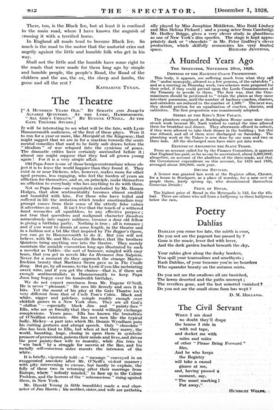The Theatre
[" A HUNDRED YEARS OLD." BY SERAFfN AND JOAQUIN ALVAREZ QUINTERO. AT THE LYRIC, HAMMERSMITH. " ALL GOD'S CHILLUN." BY EUGENE O'NEILL. AT THE GATE THEATRE STUDIO.] IT will be interesting to see what will be the fate, with Lyric Hammersmith audiences, of the first of these plays. Were it to run for a year or more, like Marigold at the Kingsway, that might suggest that we are in for a reaction towards the senti- mental comedies that used to be fairly safe draws before the " idealism " of war relapsed into the cynicism of peace. The dramatic critics have certainly succumbed before it ; almost one might suppose that they had all grown young again ! For it is a very simple affair.
Old Papa Juan is one of those benign centenarians whose ob- ject it is to leave the world happier than they found it. They exist in or near Dickens, who, however, makes room for other aged persons, less engaging, who feel the burden of years an affliction for themselves, and so, on principle, make themselves an affliction to everybody who has anything to do with them.
Not so Papa Juan--so exquisitely embodied by Mr. Horace Hodges, that slow sentimentality becomes almost credible and beautiful with him. For those who have toiled and suffered in life the irritation which tender emotionalism may prompt comes from their sense of the utterly false values it advertises as real. It isn't true that the touch of a withered hand reconciles all squabblers, to any effective purpose ; not true that querulous and malignant character dissolves miraculously into sugary mildness, because a dear old fellow is giving a birthday party. Nothing is true ; all is romance ; and if you want to dream at some length, in the theatre and in a fashion not a bit like that inspired by The Beggar's Opera, you can go to Hammersmith to do it. But you will not believe, with Mr. and Mrs. Granville Barker, that the brothers Quintero bring anything new into the theatre. They merely maintain the amiable convention long ago illustrated by such a novelist as Valdes—the sort of humour, mingled with easy tears, that you get in novels like La Ilermana San Sulpicio. Never .for a moment do they approach the strange Maeter- linekian beauty that Martinez Sierra gave us in The Cradle Song. But go, by all means, to the Lyric if you like inebriating sweet wine, and if you get the chance—that is, if there are enough sentimentalists in Hammersmith to keep Papa Juan long happy over his hundredth birthday.
We do not expect sweetness from Mr. Eugene O'Neill. He is never " pleasant." He sees life fiercely and sees it in bits. Yet the moral of his play at the Gate Theatre isn't very different from that of Uncle Tom's Cabin. Black and white, nigger and paleface, mingle readily enough over childish games in a New York slum. They are all God's " chillun ' — especially black Jim and " painty-face " Ella, who are so friendly that they would willingly exchange complexions. Years pass. Ella has known the brutalities of O'Neillian existence. She has met men like the typical bully, Mickey—a part into which Mr. Dennis Wyndham puts his cutting gestures and abrupt speech. Only " chocolate " Jim has been kind to Ella, but when at last they marry, the world, haunting, huge, closing in upon them in symbolic pressure of persecution, poisons their minds and lives, and drives the poor painty-face wife to insanity, while Jim tries to " win back by a struggle for success at the Bar, and his racially self-conscious sister resents the intrusion of the white.
It is briefly, vigorously told—a " message conveyed in an exaggerated anecdote after Mr. O'Neill's violent manner ; with pity intervening to excuse, but hardly to explain, the folly of these two in returning after their marriage from Europe, where nobody minded," to face up to the Colour Problem, and the horrors of the " subconscious " rising against them, in New York.
Mr. Harold Young (a little inaudible) made a real char- acter of Jim Harris ; his mother, sister, and wife are pathetic*
ally played by Miss Josephine Middleton, Miss Enid Lindsey and Miss Helena Pickard.; and a young actor from Cambridge Mr. Hedley Briggs, gives a very clever study in ghastliness as one of New York's dim apaches. The stage is kept appro- priately dark or " chocolate " in Mr. Peter Godfrey's clever production, "which skilfully economizes his very limited








































 Previous page
Previous page